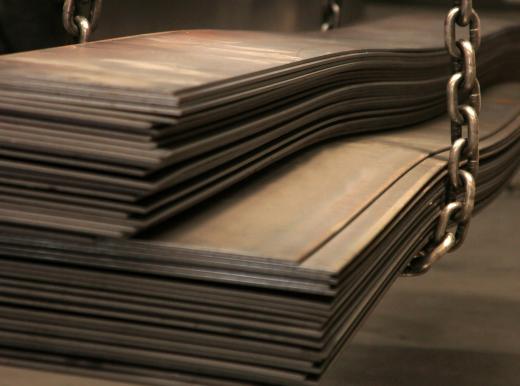A cleko, or cleco as they are commonly spelled, is a type of fastener that is used to temporarily fasten multiple sheets of aluminum or steel together while they are being test-fitted into position. Consisting of a steel body surrounding a spring and plunger-type mechanism along with step-locks, the cleko uses a special type of pliers to compress the spring and step-locks. The step-locks are inserted into a pre-drilled hole in the sheet steel or aluminum, and once the pliers release the spring, the cleko pulls the materials tightly together. The size of the hole that a cleko will properly fit is correlated to the body color of the faster. Another version of the fastener uses a wing nut to tighten the mechanism more snugly than the spring type is able to do; however, it typically requires more time to install and remove than its spring-loaded counterparts.
Originally designed to aid in the building of aircraft, the cleko has been used in all types of sheet metal work from boat construction to aircraft and automobile body work. Often referred to as a removable pop rivet, the cleko is often used when re-skinning aircraft, boats and race cars where large sheets of aluminum are placed into position and may require frequent removal before finally being permanently installed. One benefit in using the fastener is that the cleko is able to replace a helper by holding the materials tightly in position, allowing a lone worker to manipulate and fit a panel into place.

Available at many tool distributors and aircraft supply stores, the removable fasteners are offered in four sizes, with each being a definitive color for easy identification when applying them. It is crucial to purchase the special pliers when purchasing the fasteners since they are practically useless without them. The cost of the fasteners is relatively low when compared to the cost of installing pop rivets and drilling them out numerous times when fitting and installing a body panel. Many dedicated repair shops will have nearly 100 or more of each size of clecko on hand to tackle most repair jobs.
The cleko fastener is not limited strictly to metallic panels. Many auto-body shops will also use the fasteners when installing fiberglass body panels and accessories onto a vehicle. The springs in the fasteners are strong enough to hold the fragile pieces in place without damaging or cracking them. The large size of the cleko body also aids in ensuring that the fasteners are being applied in a straight and evenly-spaced location by giving an easy visual image to study.
